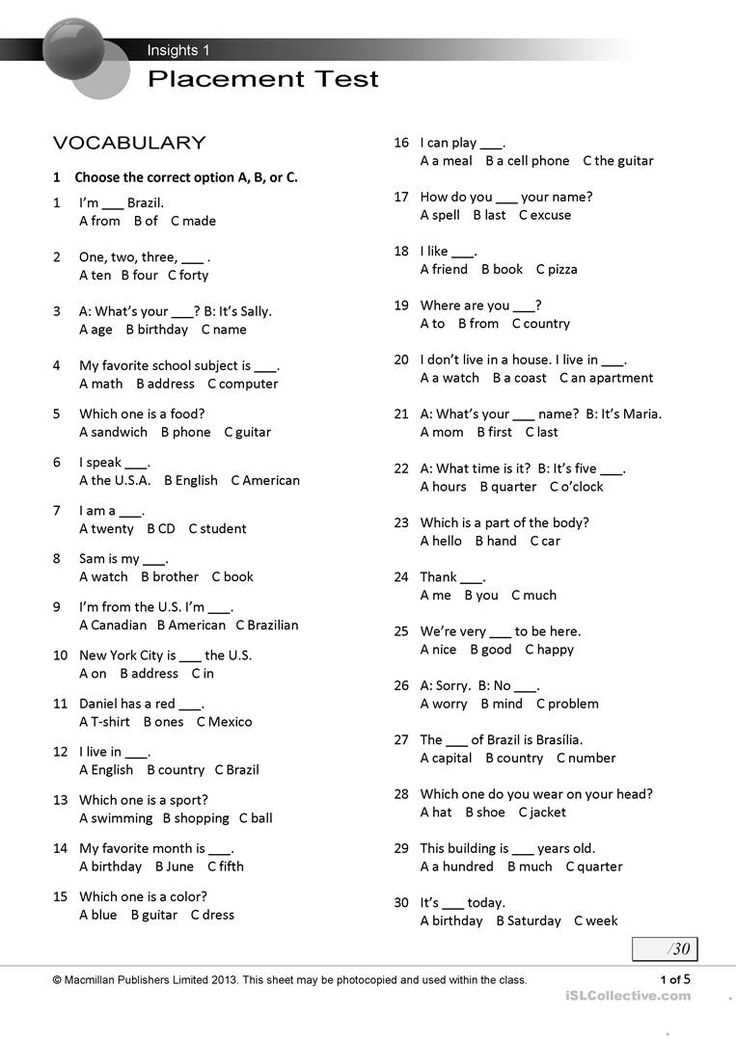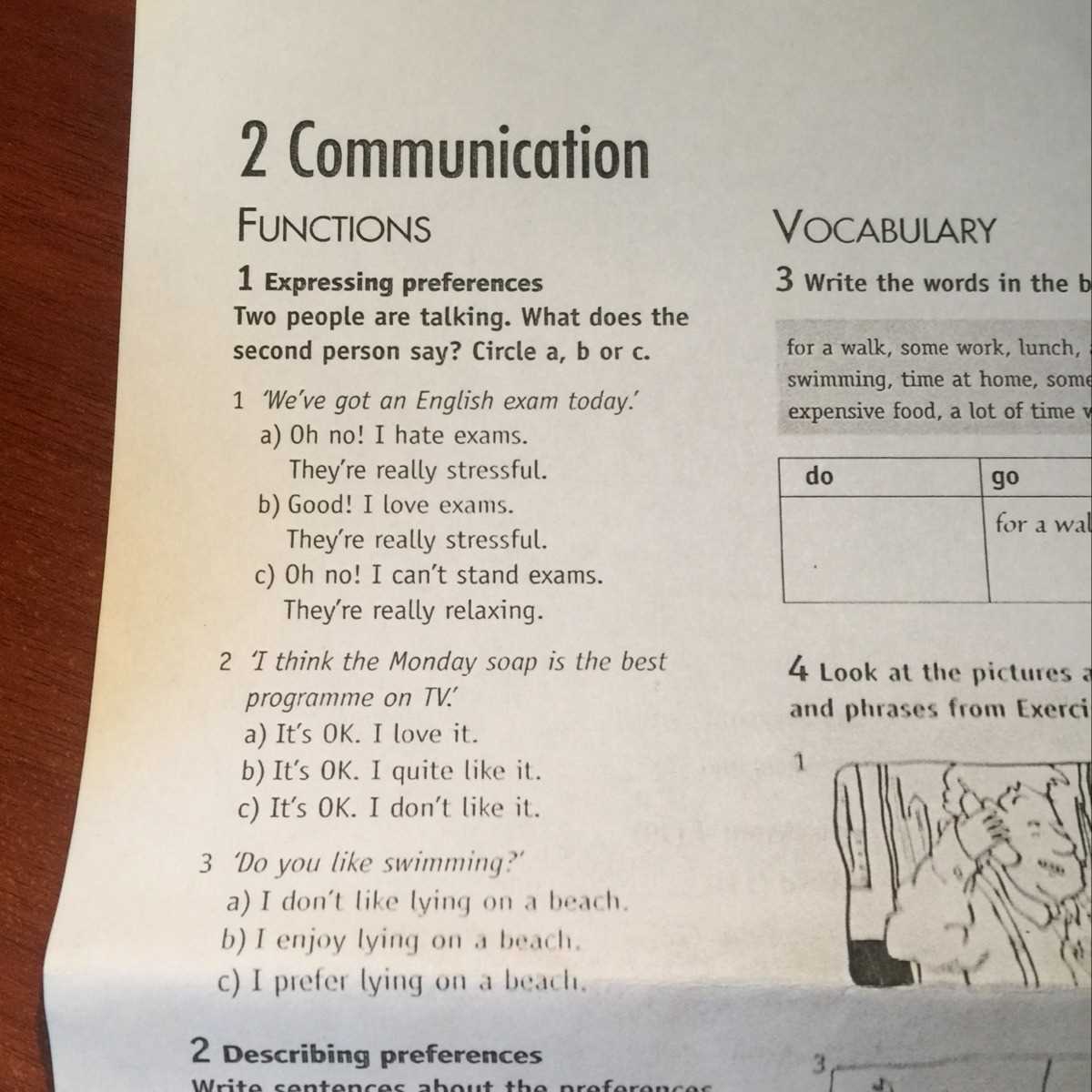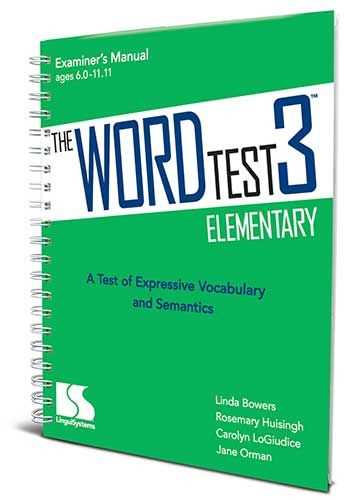
The Expressive Vocabulary Test (EVT) is designed to assess an individual’s expressive vocabulary skills, which refers to the ability to retrieve and use words when speaking or writing. Developed by a team of experts in the field of language and cognition, this standardized test provides valuable information about an individual’s language development and can be used in a variety of settings.
The EVT is commonly used in educational and clinical settings to evaluate both children and adults. It is particularly useful for identifying language delays or disorders, as well as tracking progress in vocabulary development over time. By assessing an individual’s expressive vocabulary, the EVT can provide insights into their overall language abilities, including their understanding and use of words.
The EVT consists of a series of items where the individual is asked to name or define different pictures or objects. These items range in difficulty, allowing the test to be tailored to the individual’s age and language proficiency level. The test can be administered either orally or in written form, depending on the individual’s abilities and preferences.
Expressive Vocabulary Test (EVT): What You Need to Know

If you are looking to assess and measure an individual’s expressive vocabulary skills, the Expressive Vocabulary Test (EVT) is an essential tool to consider. The EVT is specifically designed to evaluate and quantify a person’s ability to understand and use words effectively. This test is commonly used in educational and clinical settings to assess language development, identify learning disabilities, and create appropriate intervention strategies.
What does the EVT assess?
The EVT primarily focuses on assessing an individual’s expressive vocabulary skills, which refers to their ability to use and understand words in spoken or written form. The test evaluates various language components, such as word retrieval, word knowledge, semantic relationships, and contextual comprehension. It provides insights into a person’s ability to formulate and articulate ideas, use appropriate language in different settings, and demonstrate comprehension of complex vocabulary.
How is the EVT administered?
The EVT is typically administered individually by a trained professional, such as a speech-language pathologist or an educational psychologist. The test consists of an array of tasks and exercises, including naming objects, defining words, answering questions, describing pictures, and providing synonyms or antonyms for given words. The administrator records responses and scores them based on specific criteria to determine the individual’s expressive vocabulary level.
What are the benefits of using the EVT?
The EVT offers several benefits for educators, clinicians, and researchers. It provides a standardized and reliable measure of expressive vocabulary skills, allowing professionals to compare an individual’s performance with normative data. It helps identify language delays or deficits, guide intervention planning, and monitor progress over time. The EVT can also be a valuable tool in research studies investigating language development, cognitive processes, and the impact of interventions on vocabulary outcomes.
Conclusion
The Expressive Vocabulary Test (EVT) plays a crucial role in assessing and evaluating an individual’s expressive vocabulary skills. This test provides valuable insights into a person’s language abilities and can guide intervention strategies for individuals with language delays or disorders. With its comprehensive tasks and reliable scoring criteria, the EVT is an essential tool in educational and clinical settings, contributing to effective language assessment and intervention.
The Importance of Assessing Expressive Vocabulary
Assessing expressive vocabulary is a vital component in understanding an individual’s language skills and overall communication abilities. Expressive vocabulary refers to a person’s ability to use words and phrases to convey their thoughts, ideas, and feelings effectively. It plays a crucial role in various aspects of life, including academic success, social interactions, and future career opportunities.
1. Identifying Language Development: Assessing expressive vocabulary allows professionals, such as educators and speech-language pathologists, to evaluate a person’s language development. By assessing the number of words a person can use and their ability to communicate complex ideas, professionals can gain insights into the individual’s overall language skills and identify any areas that may require additional support or intervention.
2. Academic Success: Expressive vocabulary is closely associated with academic success. A strong vocabulary enables individuals to understand and express themselves effectively in various subjects and helps them comprehend written texts. By assessing expressive vocabulary, educators can identify students who may struggle with comprehension or have difficulty expressing their knowledge, allowing them to provide targeted interventions and support to improve academic performance.
3. Social Interactions: Effective communication is essential for successful social interactions. Assessing expressive vocabulary helps determine an individual’s ability to engage in conversations, express their needs and desires, and understand others. A strong expressive vocabulary enables individuals to participate in social activities confidently, build relationships, and connect with others on a deeper level.
4. Career Opportunities: The ability to express oneself clearly and effectively is a valuable skill in the professional world. A strong expressive vocabulary enhances one’s communication skills, enabling them to articulate their ideas, persuade others, and excel in job interviews. Assessing expressive vocabulary early on can help individuals develop and refine their language skills, setting them up for success in future career opportunities.
In conclusion, assessing expressive vocabulary is crucial for understanding an individual’s language development, promoting academic success, facilitating social interactions, and preparing for future career opportunities. By identifying and addressing any gaps in expressive vocabulary skills, individuals can improve their overall communication abilities and enhance their quality of life.
Understanding the Expressive Vocabulary Test

The Expressive Vocabulary Test (EVT) is a standardized assessment tool used to measure an individual’s expressive vocabulary skills. It provides valuable insights into a person’s ability to retrieve and verbalize words, which is a crucial aspect of language development and communication. The test is often used in educational and clinical settings to evaluate a person’s language proficiency and identify areas of strength and weakness.
One of the key features of the EVT is its focus on word retrieval and verbal expression. The test measures an individual’s ability to name objects, actions, and concepts, using both concrete and abstract words. It assesses vocabulary skills across different semantic categories, such as animals, food, or emotions, to provide a comprehensive picture of an individual’s lexical knowledge.
The EVT consists of various tasks that assess different aspects of expressive vocabulary. These tasks may include naming pictured objects, defining words, generating words that fit specific criteria, or completing sentences with appropriate words. The test is administered individually and usually takes around 15-20 minutes to complete. The results are typically reported as standard scores and percentile ranks, allowing for easy comparison with others of the same age or demographic group.
The EVT can be a valuable tool for educators, speech-language pathologists, and psychologists working with individuals of all ages. It can help identify language delays or disorders, track progress in vocabulary development, and inform intervention strategies. Additionally, the test can be used to assess the impact of language interventions and measure the effectiveness of different educational programs.
Benefits of the Expressive Vocabulary Test:
- Provides objective measurements of expressive vocabulary skills
- Identifies specific areas of strength and weakness in vocabulary knowledge
- Allows for easy comparison with others in the same age or demographic group
- Helps track progress in vocabulary development over time
- Assesses the impact of language interventions and educational programs
Administration and Scoring of the EVT
The Expressive Vocabulary Test (EVT) is a widely used assessment tool designed to measure an individual’s expressive vocabulary skills. It is commonly used in educational and clinical settings to evaluate a person’s ability to retrieve and produce words to express their thoughts and ideas. The EVT is suitable for individuals aged 2 years and older, making it a versatile assessment tool.
Administration: The EVT is typically administered on a one-on-one basis by a trained professional, such as a speech-language pathologist or a psychologist. The test begins with an introductory section where the examiner establishes rapport with the individual and explains the purpose of the assessment. The individual is then presented with a series of pictured objects, and they are asked to name each object. The test progresses in difficulty, with the objects becoming increasingly abstract and less common.
During the administration of the EVT, the examiner carefully records the individual’s responses to each item, noting any errors or omissions. It is important for the examiner to provide adequate time for the individual to respond and to use standardized prompts to encourage verbal expression. The administration of the EVT typically takes around 20 to 30 minutes, depending on the individual’s age and ability.
- Scoring: Once the administration of the EVT is complete, the examiner scores the individual’s responses based on a standardized scoring guide. Each correct response is assigned a score of one, while errors or omissions are given a score of zero. The individual’s scores are then tallied to calculate their total expressive vocabulary score.
- The EVT provides normative data for various age groups, allowing the examiner to compare the individual’s performance to that of their peers. This allows for the identification of potential vocabulary deficits or delays.
- The EVT also provides separate scores for different categories of words, such as nouns, verbs, and adjectives, allowing for a more comprehensive evaluation of an individual’s expressive vocabulary skills.
In conclusion, the administration and scoring of the EVT are standardized and systematic, allowing for reliable and valid assessment of an individual’s expressive vocabulary skills. The test provides valuable insights into an individual’s ability to retrieve and produce words, helping professionals make informed decisions regarding intervention and support.
Interpreting EVT Scores
The Expressive Vocabulary Test (EVT) is a commonly used assessment tool designed to measure an individual’s expressive vocabulary skills. This test evaluates a person’s ability to accurately and fluently use words to express their thoughts and ideas. EVT scores are generated based on the number of correctly produced words by the test-taker within a given time frame.
Understanding EVT Scores
EVT scores provide valuable insights into an individual’s expressive vocabulary skills. The scores are typically reported in percentile ranks, standard scores, or age equivalents. Percentile ranks indicate the test-taker’s standing in comparison to a normative sample, with higher percentiles indicating better performance. Standard scores provide a standardized measure of the individual’s expressive vocabulary skills, allowing for comparisons across age groups. Age equivalents, on the other hand, indicate the average performance level of individuals at a specific age.
Interpreting EVT Scores
When interpreting EVT scores, it is important to consider the context and purpose of the assessment. For example, if the EVT is used as part of an evaluation for speech and language therapy, a lower score may indicate a potential area of intervention. However, it is essential to remember that EVT scores are just one piece of the puzzle and should be interpreted in conjunction with other assessment results and observations.
It is worth noting that EVT scores may vary based on factors such as the individual’s familiarity with the language, cultural background, and educational experiences. Therefore, it is crucial to consider these factors when interpreting and discussing EVT scores.
Using EVT Scores for Intervention
EVT scores can guide intervention planning for individuals with expressive vocabulary difficulties. If a person’s EVT score falls below the expected range for their age or shows a significant discrepancy with their receptive vocabulary skills, targeted interventions can be designed to improve expressive vocabulary abilities. These interventions may include strategies such as vocabulary enrichment activities, language stimulation techniques, or specific therapy programs tailored to the individual’s needs.
Applications of the Expressive Vocabulary Test EVT
The Expressive Vocabulary Test (EVT) is a valuable tool used in various settings to assess an individual’s expressive vocabulary skills. With its standardized and reliable scoring system, the EVT has proven to be beneficial in several areas.
Educational Settings
In educational settings, the EVT can be used to identify students who may have difficulties with expressive vocabulary. Teachers and special education professionals can administer the test to assess the students’ vocabulary abilities and develop appropriate intervention strategies to improve their language skills. The test results can also help in monitoring the progress of students receiving language intervention or support services, ensuring that they are making the necessary improvements over time.
Clinical Practice
In a clinical setting, the EVT can be a valuable tool in diagnosing and evaluating language disorders and delays. Speech-language pathologists can use this test to assess a client’s expressive vocabulary skills and determine if their language development is age-appropriate. The test scores can provide valuable information about the client’s strengths and weaknesses in expressive vocabulary, aiding in the development of targeted treatment plans.
Research
The EVT is not limited to clinical or educational practice but can also be utilized in research studies. Researchers can administer the test to participants to gather data on expressive vocabulary abilities in specific populations, such as individuals with developmental disorders or individuals from different cultural backgrounds. The EVT can contribute to the understanding of language development and the impact of various factors on vocabulary acquisition.
Conclusion

The Expressive Vocabulary Test (EVT) is a versatile assessment tool that finds applications in educational, clinical, and research settings. Its standardized scoring system allows for accurate evaluation of an individual’s expressive vocabulary skills. By utilizing the EVT, professionals can identify language difficulties, develop effective intervention strategies, and contribute to the advancement of knowledge in the field of language development.
Q&A:
What is the Expressive Vocabulary Test?
The Expressive Vocabulary Test (EVT) is a standardized assessment tool used to measure a person’s expressive vocabulary skills.
Who uses the Expressive Vocabulary Test?
The Expressive Vocabulary Test is used by speech-language pathologists, educators, and researchers to assess expressive vocabulary skills in individuals.
How is the Expressive Vocabulary Test administered?
The Expressive Vocabulary Test is typically administered individually, where the test taker is asked to name pictures or describe objects using specific words.
What can the results of the Expressive Vocabulary Test indicate?
The results of the Expressive Vocabulary Test can indicate a person’s level of expressive vocabulary skills, which can be helpful in identifying language delays or disorders.
What are some applications of the Expressive Vocabulary Test?
The Expressive Vocabulary Test can be used to evaluate language development in children, assess language proficiency in individuals learning a second language, and monitor language skills in individuals with language disorders.